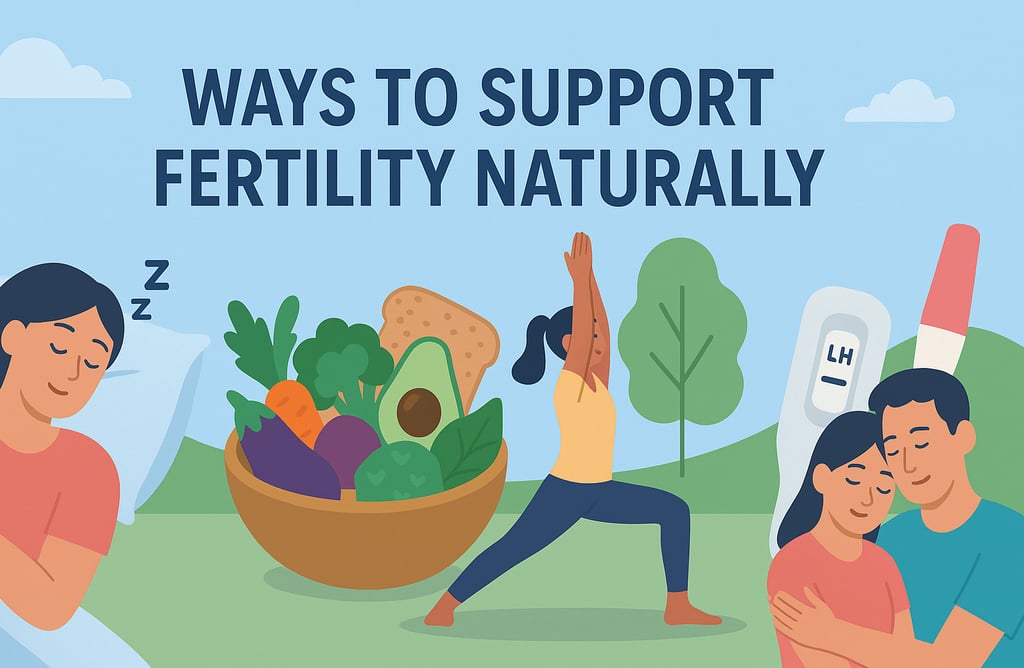7 Natural Ways to Boost Fertility (Backed by Science)
Backed by science, these natural fertility-boosting tips cover sleep, nutrition, stress, and cycle tracking to support your body before IVF.
WELLNESS & FOOD


Before you start IVF or other fertility treatments, it's completely natural to wonder: is there anything I can do to improve my chances of success? The answer is yes — and it doesn’t always mean expensive supplements or fringe remedies. Many small, natural lifestyle changes are backed by solid evidence and can give your fertility the gentle nudge it needs.
Here are research-supported ways to support your fertility naturally, whether you're just beginning your journey or preparing for treatment.
1. Prioritise Sleep — and Make It Regular
Sleep isn't just for rest — it’s essential for reproductive hormone regulation. Disrupted sleep can interfere with the delicate hormonal rhythm needed for ovulation and sperm production.
Aim for 7–9 hours per night.
Keep a regular bedtime and wake-up schedule (even on weekends).
Reduce blue light exposure before bed (switch off phones, use a blue light filter, or try amber-tinted glasses).
Create a cool, dark, quiet sleep environment — especially helpful if you're feeling overwhelmed by treatment stress.
Evidence tip: Studies show that poor sleep is associated with irregular cycles and lower IVF success rates.
2. Support Your Cycle Through Nutrition
Fertility-friendly nutrition doesn’t mean a complete diet overhaul. But certain patterns do help:
Eat whole, unprocessed foods (think colourful vegetables, legumes, nuts, seeds, and whole grains).
Prioritise unsaturated fats (like olive oil, avocado, and oily fish) and reduce trans fats (found in processed snacks).
Choose full-fat dairy over low-fat — some studies show it’s better for ovulation.
Get plenty of iron (especially from plant sources like lentils and spinach, paired with vitamin C to boost absorption).
Stay hydrated — your cervical mucus and uterine lining depend on it.
Evidence tip: The "fertility diet" (popularised by Harvard research) has been linked with lower risk of ovulatory infertility.
3. Balance Movement With Rest
Exercise supports blood flow, hormone balance, and mental health — all crucial to fertility. But too much high-intensity exercise (especially with low body fat) can suppress ovulation.
Aim for 30–60 minutes of moderate movement most days.
Walking, yoga, Pilates, swimming, and fertility-friendly strength training are ideal.
Avoid intense, prolonged cardio unless advised by your doctor.
For men: Exercise boosts testosterone and sperm quality, but anabolic steroids or extreme training can have the opposite effect.
4. Learn to Track Your Cycle
Knowing when you ovulate helps time intercourse or treatment accurately — and gives insight into your hormonal patterns.
Try:
Basal body temperature (BBT) tracking
Cervical mucus observations
Ovulation predictor kits (OPKs)
Cycle tracking apps (like Natural Cycles or Flo)
Bonus: Tracking also helps you feel more in control, which can reduce anxiety during the often-unpredictable fertility journey.
5. Lower Stress — Gently, Not Perfectly
You don’t need to be perfectly calm — that’s not realistic. But high, chronic stress can affect ovulation, menstrual regularity, and sperm health.
Try:
Mindfulness or guided meditation (apps like Headspace or Insight Timer)
Gentle yoga (fertility-specific classes can be wonderful)
Acupuncture — some studies suggest it may support fertility by reducing stress and improving blood flow
Spending time in nature or doing something creative
Evidence tip: Reducing stress has been linked with higher pregnancy rates in some IVF and TTC studies.
6. Check Environmental Exposures
Everyday products can contain endocrine-disrupting chemicals that interfere with hormones.
Switch to fragrance-free or natural cleaning and beauty products.
Avoid plastics marked with recycling code 3 or 7 (often contain BPA).
Don’t microwave food in plastic containers.
Choose organic produce when possible — especially for “dirty dozen” items.
For men: Sperm are especially sensitive to toxins, so avoiding pesticides, smoke, and excess alcohol can really help.
7. Nurture Emotional Connection
Fertility struggles can strain relationships — but connection is just as important as lifestyle choices.
Communicate openly with your partner (even if it feels awkward).
Schedule quality time not focused on TTC.
Consider couple’s therapy or fertility coaching for extra support.
Staying emotionally connected creates a stronger foundation for the road ahead — whether you conceive naturally or with help.
Natural fertility support doesn’t replace medical help — but it can complement it beautifully. Whether you're hoping to conceive without intervention or simply want to enter IVF in the best possible shape, these small shifts can make a big difference.
There’s no one-size-fits-all approach, so be kind to yourself. Choose what feels sustainable and supportive, not stressful.
© 2025. All rights reserved.
